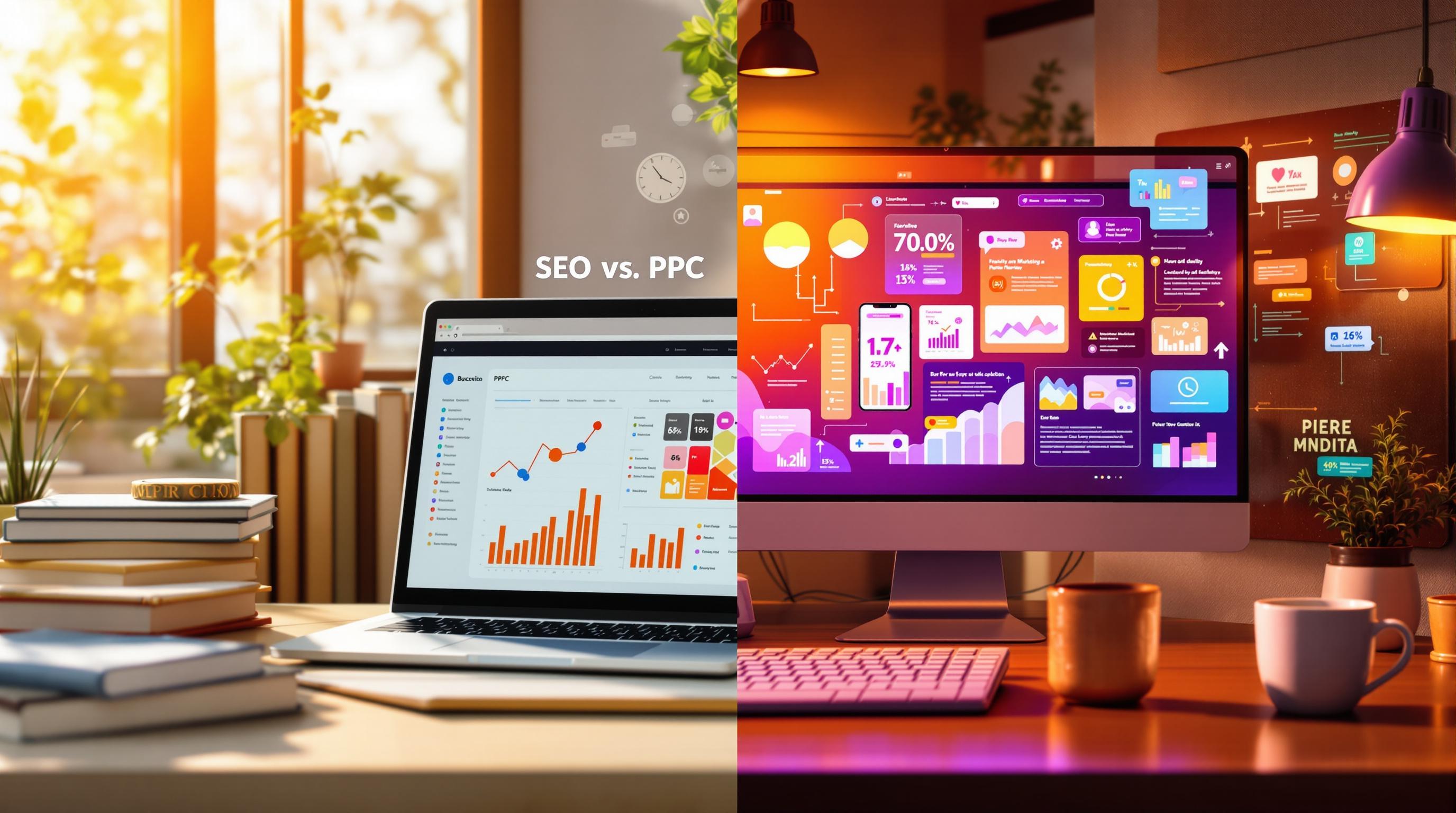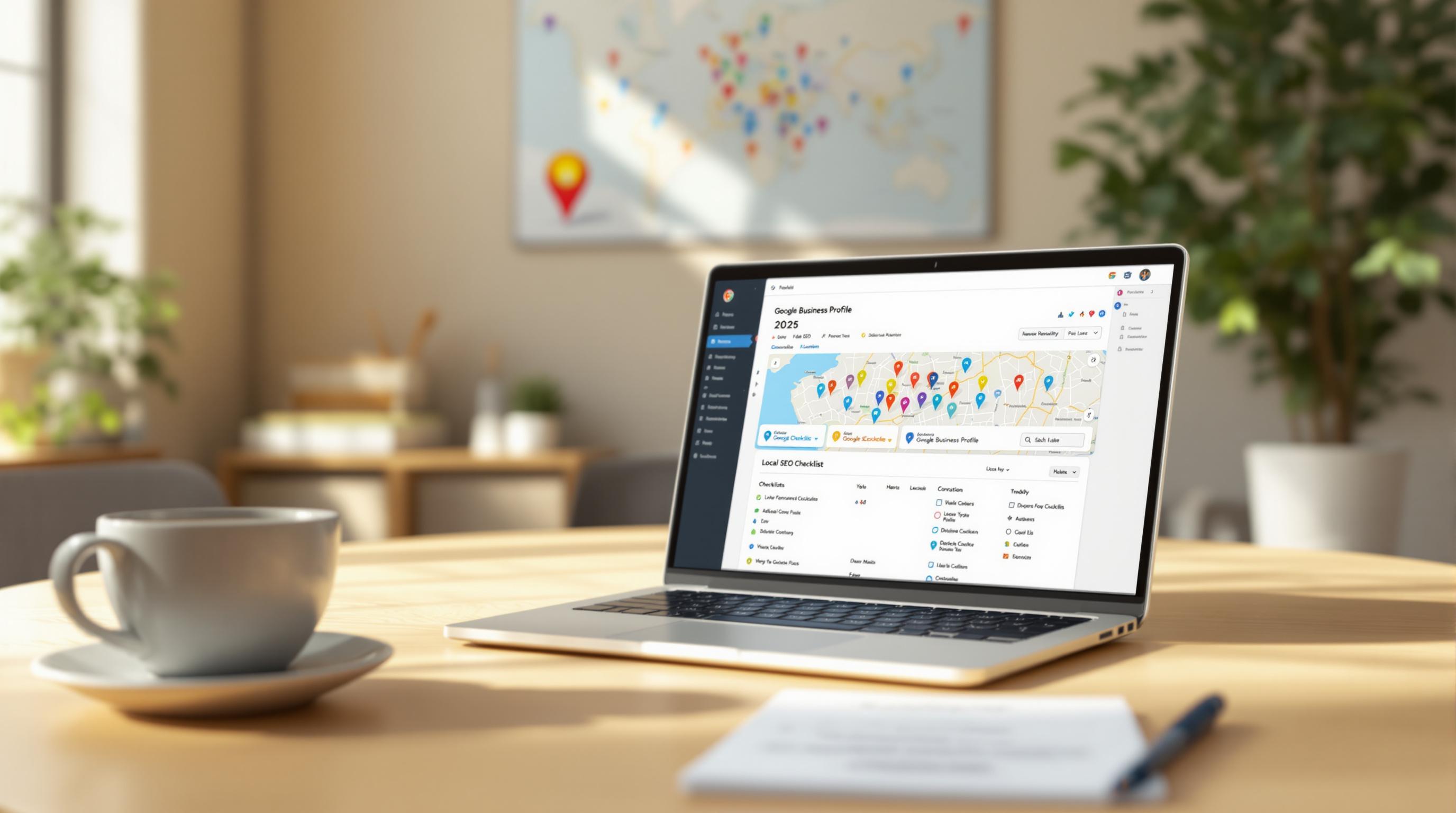On-Page SEO and Off-Page SEO are two key strategies to improve your website's search engine rankings. Here's the difference:
- On-Page SEO: Focuses on optimizing elements on your website like content, meta tags, URLs, and site structure.
- Off-Page SEO: Involves external factors like backlinks, social signals, and reputation building to increase your site's authority.
Quick Comparison:
| Aspect | On-Page SEO | Off-Page SEO |
|---|---|---|
| Control | Full control over website elements | Relies on external factors |
| Focus | Content, technical setup, internal links | Backlinks, social media, reputation |
| Time to Results | Weeks | 3-12 months |
| Cost | Lower, mainly content-related | Higher, involves outreach efforts |
Start with On-Page SEO for quicker results, then invest in Off-Page SEO for long-term growth. Both strategies work best when combined.
On-Page vs. Off-Page SEO: Key Differences Explained for Beginners
On-Page SEO Explained
What Is On-Page SEO?
On-Page SEO focuses on optimizing everything directly on your website - like content, HTML code, meta tags, URLs, and internal links - to boost your search engine rankings.
Key On-Page SEO Techniques
To get the most out of On-Page SEO, you need to apply a few important techniques:
Content Optimization
- Write high-quality content that aligns with user intent and naturally includes primary keywords within the first 100-150 words.
- Use clear heading structures (H1, H2, H3) to organize your content.
- Create descriptive, keyword-rich URLs.
Technical Aspects
- Craft meta titles and descriptions within 155-160 characters for better click-through rates.
- Use schema markup to help search engines understand your content better.
- Make sure your site is mobile-friendly and loads quickly.
Internal Linking
- Use anchor text that clearly describes the linked content.
- Connect related pages meaningfully to guide users and search engines.
- Keep your site structure simple and easy to navigate.
Why On-Page SEO Matters
On-Page SEO comes with several benefits that make it a key part of any digital marketing plan:
| Benefit | Description | Why It Matters |
|---|---|---|
| Direct Control | You can make changes instantly. | Allows for quick fixes and updates. |
| Cost-Efficiency | Requires little to no extra tools. | More affordable than Off-Page SEO. |
| Trackable Results | Improvements are easy to measure. | Provides clear insights into ROI. |
For instance, shorter URLs tend to perform better in search rankings [1]. A URL like 'www.example.com/on-page-seo' is more effective than something lengthy like 'www.example.com/blog/2024/01/what-is-on-page-seo-and-how-to-implement-it'. Keep it simple and focused!
Off-Page SEO Explained
Off-Page SEO Definition
Off-Page SEO focuses on elements outside your website, like backlinks and social media signals, to boost your site's authority and rankings. Think of it as building your website's reputation across the web. Unlike On-Page SEO, where you have direct control, Off-Page SEO relies on external factors, requiring outreach and relationship-building.
It's similar to how a restaurant's reputation grows through positive reviews and word-of-mouth recommendations.
Off-Page SEO Strategies
Off-Page SEO success revolves around three main approaches:
| Strategy | Description | Impact on SEO |
|---|---|---|
| Backlink Building | Securing links from credible, high-quality websites | A major ranking factor |
| Social Signals | Engagement on social platforms | Boosts visibility indirectly |
| Brand Management | Managing and monitoring online reputation | Builds trust and authority |
Research from Moz highlights that backlinks contribute to 22% of ranking factors [1]. This makes them one of the most important components of Off-Page SEO.
Challenges with Off-Page SEO
Off-Page SEO can be tough because it depends on factors beyond your direct control. Building quality backlinks and authority takes time and effort. For instance, Ahrefs reports the average cost of buying a backlink is $361 [1]. However, buying links violates Google's guidelines and risks penalties.
To succeed in Off-Page SEO, you need to:
- Create content worth referencing.
- Build genuine relationships with industry leaders.
- Stay active and engaged on social platforms.
- Keep a close eye on and manage your online reputation.
Off-Page SEO is a long-term game. It demands consistent effort, meaningful connections, and content that adds value. While it takes time, the results can significantly enhance your site's credibility and rankings.
Next, let’s dive into how On-Page and Off-Page SEO compare in their roles and impact on search rankings.
sbb-itb-d7fe25c
Comparing On-Page and Off-Page SEO
Differences Between On-Page and Off-Page SEO
On-Page SEO involves elements you can directly control, like your website's content, meta tags, and technical setup. You can make adjustments quickly and without relying on external factors. Off-Page SEO, on the other hand, is all about external influences like backlinks and social signals. It takes more time and effort, often requiring outreach and relationship-building.
Here’s how they differ:
- Control: You have full control over On-Page elements, whereas Off-Page relies on external factors.
- Implementation: On-Page changes can be implemented quickly, while Off-Page progress tends to be slower.
- Resources: On-Page requires technical expertise, while Off-Page focuses on networking and outreach efforts.
- Costs: On-Page may involve content creation costs, while Off-Page often includes expenses for relationship-building and managing social media.
Effect on Search Rankings
On-Page SEO ensures your site is relevant to specific keywords, making it easier for search engines to understand and categorize your content. Off-Page SEO, meanwhile, builds your site’s authority. Backlinks, for example, serve as endorsements, signaling to search engines that your site is trustworthy and worth ranking higher. Together, these strategies create a solid foundation for better visibility in search results.
Time to See Results
On-Page SEO changes, like fixing technical errors or optimizing content, can deliver noticeable results in just a few weeks. Off-Page SEO, such as acquiring backlinks or improving domain authority, typically takes longer - anywhere from 3 to 12 months - to show meaningful impact.
Here’s a rough timeline for common SEO efforts:
- Technical fixes and meta updates: Results in 1-4 weeks.
- Backlinks and domain authority growth: Takes 3-12 months.
- Social signals: Builds authority over time.
Google’s page experience update highlights the importance of secure protocols (HTTPS) and mobile-friendly design for faster ranking improvements [6]. By understanding these timelines, you can better allocate your resources and focus on what matters most. A balanced approach combining both On-Page and Off-Page SEO is key to long-term success.
Conclusion and Practical Advice
Key Points Summary
On-Page and Off-Page SEO are two sides of the same coin, working together to improve search rankings. On-Page SEO focuses on creating high-quality, optimized content that appeals to users and search engines alike. Off-Page SEO, on the other hand, boosts credibility through external signals like backlinks. Research shows that combining these strategies increases the chances of ranking in the top 10 search results by 57% [5].
Start with On-Page SEO to see results faster by refining your site's technical setup and content. Once that's in place, shift to Off-Page efforts to build authority and long-term visibility. This step-by-step approach ensures a solid base while preparing for sustained growth.
Advice for Small Businesses
For small businesses working with limited resources, here's a simplified plan to kickstart SEO:
| Timeline | Focus Area | Key Actions |
|---|---|---|
| Month 1-3 | Laying the Groundwork | Fix technical issues and create engaging content |
| Month 4-6 | Building Local Presence | Focus on local SEO and interact on social media |
| Month 7+ | Growing Authority | Develop quality backlinks and industry connections |
Since Off-Page SEO can be resource-intensive, prioritize On-Page improvements first. This lets you achieve results faster while setting the stage for more advanced strategies [4].
Balancing SEO Approaches
To see long-lasting results, balance both strategies over time. Use tools like Google Analytics to measure On-Page performance and Ahrefs to track backlinks. Regularly reviewing this data will help you pinpoint areas that need attention and keep your efforts on track [5].
Concentrate on crafting content that serves your audience while gradually building credibility with quality backlinks. Allocate your resources wisely - if your website's technical aspects need work, address those first before diving into Off-Page tactics.
Consistency is key. Keep refining both On-Page and Off-Page strategies based on performance metrics and industry trends [2][3]. A balanced approach will set you up for steady growth and better search visibility over time.
FAQs
Is off-page SEO still effective for SEO?
Off-page SEO plays a key role in improving rankings and building credibility. Here’s how it contributes:
| Aspect | How It Helps SEO |
|---|---|
| Authority Building | Signals trust through high-quality backlinks |
| Brand Visibility | Expands reach via social media and online mentions |
| Local Presence | Boosts local search rankings through citations |
| User Signals | Enhances engagement metrics that can impact rankings |
The effectiveness of off-page SEO depends on thoughtful planning and execution. While on-page SEO focuses on optimizing your website directly, off-page SEO works to strengthen your site's reputation. This is achieved through backlinks, social media activity, local citations, and improved user interaction metrics [5].
To see long-term benefits, businesses should treat off-page SEO as an ongoing effort. It complements on-page SEO by increasing your site's authority and expanding its reach [2]. Together, these strategies form a well-rounded SEO plan that supports both immediate and future growth.


